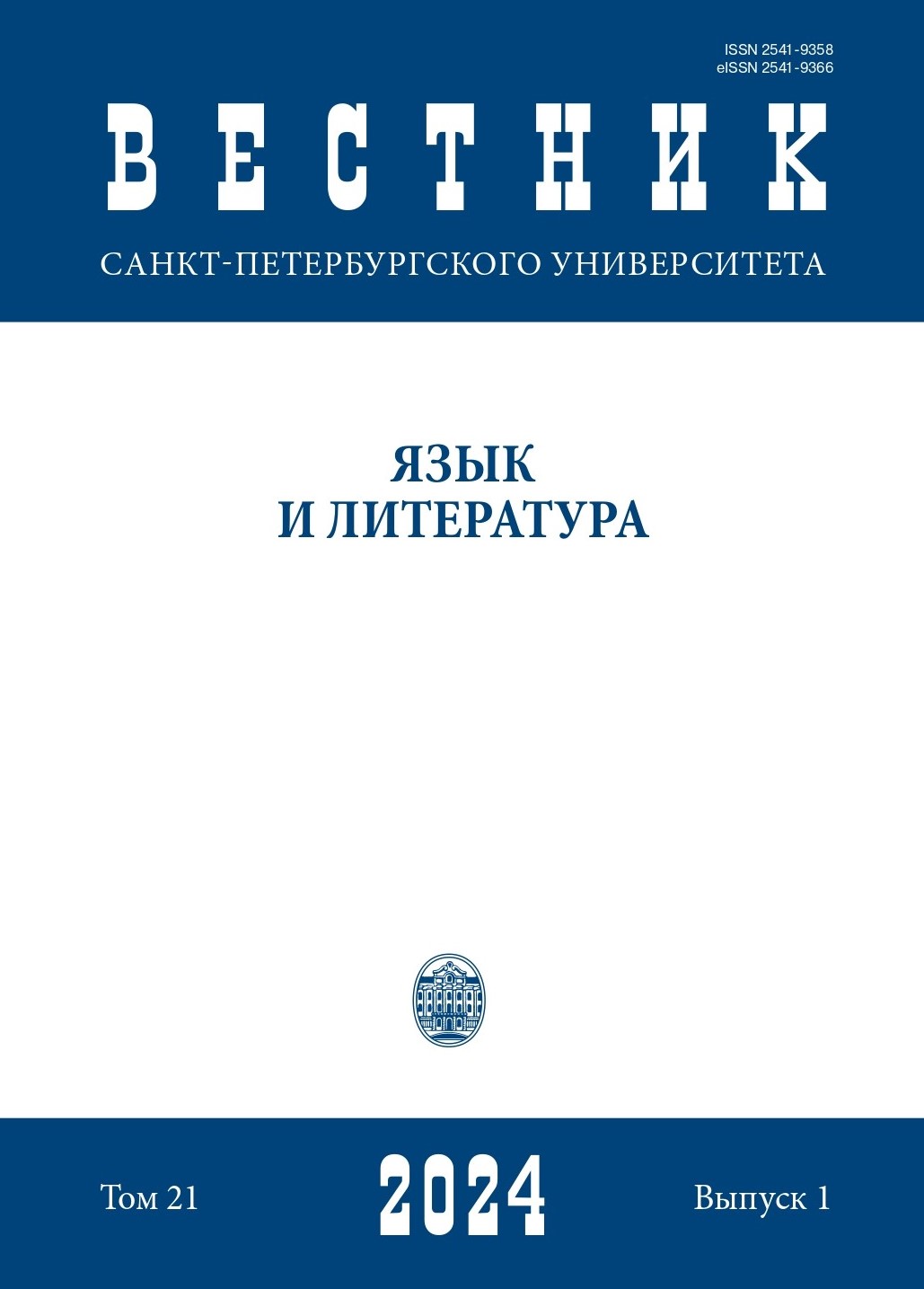On the history of Russian argotism “chuvikha”
DOI:
https://doi.org/10.21638/spbu09.2024.109Abstract
The study addresses the problem of incompleteness of data on the origin of Russian slang expression chuvikha ‘woman, girl’. It has long been associated with thieves’ cant, in which, according to A. P. Barannikov, the lexeme was gypsyism. Then the gypsy etymology began to be rejected. The purpose of the study is to fill in the gaps in the history of the word chuvikha using the methods of corpus and lexicographic analysis on the material of the Russian National Corpus, the collection of digitized books google.books, the diary service Prozhito.org, dictionaries of secret languages, slang dictionaries, etc. The following conclusions are made. Chuvikha, chuvak and a number of other slang expressions moved into the jargon of so-called stylyags (youth, passionate about Western culture) no later than the early 1950s from the jargon of restaurant musicians, so-called labukhs. Thus, the source of the argotisms of the stylyags was the slang of musicians, not thieves. Further, jargons of restaurant musicians of the 20th century are related with the secret language of orchestral musicians of the 19th century, having common roots with the slang expressions of labukhs, are given in the book. They are also related with other secret languages of the 19th century. The words chuvikha and chuvak are possibly related to the lexem chovy ‘good’, which was used in the secret languages of the 19th century (with a variant of the root chuv-) and in the aforementioned musical jargon of the 1920s as a substantive — the nomination of a person.
Keywords:
jargons, argotisms, etymology, secret languages, youth jargon
Downloads
References
Литература
Баранников 1931 — Баранников А. П. Цыганские элементы в русском воровском арго. Язык и литература. 1931, (VII): 139–158.
Гузаерова 2020 — Гузаерова Р. Р. Провинциальная франтиха: формант -их(а) в номинативном поле словообразовательной категории феминитивности. Филология и культура. Philology and Culture. 2020, (3): 24–29.
Дьячок, Шаповал 1988 — Дьячок М. Т., Шаповал В. В. Русские арготические этимологии. В сб.: Русская лексика в историческом развитии: сб. науч. тр. Федоров А. И. (отв. ред.). Новосибирск: [б. и.], 1988. С. 52–60.
Костомаров 1959 — Костомаров В. Г. Откуда слово «стиляга»? Этимологические заметки. Вопросы культуры речи. 1959, (2): 168–171.
Приемышева 2009 — Приемышева М. Н. Тайные и условные языки в России XIX в. В 2 ч. Ч. 2. Приложения. СПб.: Нестор-История, 2009.
Шаповал 2007 — Шаповал В. В. Цыганские элементы в русском воровском арго? (размышления над статьей акад. А. П. Баранникова 1931 г.). Вопросы языкознания. 2007, (5): 108–128.
Шарифуллин 2013 — Шарифуллин Б. Я. Этимология и история одного интересного слова: чувак. В сб.: Человек и язык в коммуникативном пространстве: сб. науч. ст. Шарифуллин Б. Я. и др. (ред.). Красноярск: Сибир. федер. ун-т, 2013. С. 283–287.
References
Баранников 1931 — Barannikov A. P. Gypsy elements in Russian thieves’ slang. Iazyk i literatura. 1931, (VII): 139–158. (In Russian)
Гузаерова 2020 — Guzaerova R. R. “Provintsial’naia frantikha”: formant -ikh(a) in the nominative field of the derivational category of femininity. Filologiia i kul’tura. Philology and Culture. 2020, (3): 24–29. (In Russian)
Дьячок, Шаповал 1988 — D’iachok M. T., Shapoval V. V. Russian Argotic Etymologies. In: Russkaia leksika v istoricheskom razvitii: sbornik nauchnykh trudov. Fedorov A. I. (ed.). Novosibirsk, 1988. P. 52–60.(In Russian)
Костомаров 1959 — Kostomarov V. G. Where does the word “stiliaga” come from? Etymological notes. Voprosy kul’tury rechi. 1959, (2): 168–171. (In Russian)
Приемышева 2009 — Priemysheva M. N. Secret and conditional languages in Russia in the 19th century. In 2 pts. Pt. 2. Applications. St Petersburg: Nestor-Istoriia Publ., 2009. (In Russian)
Шаповал 2007 — Shapoval V. V. Gypsy elements in Russian thieves’ slang? (Reflections on an article by Academician A. P. Barannikov, 1931). Voprosy iazykoznaniia. 2007, (5): 108–128. (In Russian)
Шарифуллин 2013 — Sharifullin B. Ia. Etymology and history of one interesting word: chuvak. In: Chelovek i iazyk v kommunikativnom prostranstve: sbornik nauchnykh statei. Sharifullin B. Ia. et al. (eds). Krasnoyarsk: Sibirskii federal’nyi universitet Publ., 2013. P. 283–287. (In Russian)
Downloads
Published
How to Cite
Issue
Section
License
Articles of "Vestnik of Saint Petersburg University. Language and Literature" are open access distributed under the terms of the License Agreement with Saint Petersburg State University, which permits to the authors unrestricted distribution and self-archiving free of charge.






